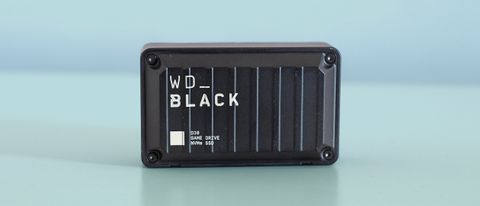TechRadar Verdict
The WD Black D30 Game Drive delivers good peak speeds and a design that suits today's consoles well. But it falls down in one of the areas that matters most: archiving of large game installs.
Pros
- +
Fast peak read/write speeds
- +
Chunky outer design says “gamer” without using RGB lighting
- +
Casing made with game use thermal stress in mind
Cons
- -
Poor speeds when transferring large game installs
- -
Xbox Series X/S can’t make use of its full speed
- -
Less effective all-round than some good quality SATA SSDs
Why you can trust TechRadar
The WD Black D30 is an external SSD aimed at gamers. Western Digital often markets it directly at Xbox Series X and Series S console owners online.
But, as you’ll see in this review, the WD Black D30 is not actually all that good a fit for this crowd. Specifically, it is disappointingly slow at moving around large game installs from your Xbox Series X to this drive. But actual load speeds while you play? They’re dandy.
Like every drive you might plug in over USB, it also cannot be used to play Series S and X enhanced games, or ones made for PS5.
That is no reason to knock the WD Black D30 specifically. However, our real-world testing shows you’ll get better all-round results by using a SATA drive like the Vertbatim SureFire DX3 or a standalone drive such as the Crucial MX500 with a separate 2.5in enclosure.
Still, if you like the look of this drive and don't plan on using it to continually ferry titles on and off of your console's SSD, it's a perfectly sound buy.
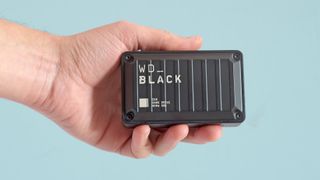
Price and availability
The WD Black D30 comes in three capacities at the time of review. These are 500GB, 1TB and 2TB. We are reviewing the middle child 1TB version.
You’ll pay around $89.99/£84.99/$139AU for the 500GB drive, $149.99/£126/$235AU for our 1TB model and $265/£229/$468AU for the top-end 2TB version.
As well as reviewing the middle-ranking drive in this range, the WD Black D30 Game Drive is the middle contender in the wider Western Digital line-up.
There’s also the hard drive based WD D10, which offers loads of storage but is much slower. The premium tier is served by the ultra-high performance WD D50, whose high-end features are much better suited to gaming PCs rather than consoles.
Design
Western Digital has worked up a very specific style for its Black series. You might call it 'shipping container chic'.
The sides of the WD Black D30 Game Drive are corrugated plastic. Little, deliberately-visible screws sit at each corner and the text printed on the side uses a sort-of industrial-tinged font.
We quite like this style. It’s a way to give an external SSD a distinctly "gamer" flavor without spattering it with RGB lighting. The WD Black D30 just has a slim white LED strip on one side, to show it’s operational. As people who occasionally play games on console through a projector, we’re glad this is a drive that can sink into the background.
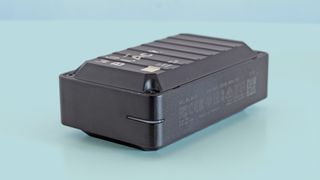
Its corrugated sides could theoretically be used to increase the outer surface area and improve cooling, but it appears to be all about the look here. We even tried removing the outer screws to see if we could get a look at what’s going on inside. However, they aren’t really what holds the WD Black D30 together. You have to prise its panels apart to open up the enclosure, and may damage it in the process.
We gave up after removing the screws: the review process stops short of torture.
The WD Black D30 also comes with a neat little plastic stand, which lets it take up less space on a TV stand or desk. This is handy because the drive is actually a lot larger than a rival NVMe external drive like the SanDisk Extreme Portable SSD v2, and thicker than most standard SATA alternatives.
This is why we wanted to be able to open the WD Black D30 up. All that additional space suggests there may be a heatsink inside. Its weight does too. The WD Black D30 weighs 125g, almost twice that of the SanDisk Extreme Portable. We’re not complaining here: this thing isn’t exactly heavy.
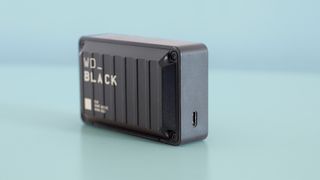
It’s also a lot more “current” than a lot of external drives. Many have been around for years and still use a microUSB 3.0 connector, but the WD Black D30 has a now more familiar USB-C socket on its back.
It’s also easy to use, although this is true of just about every drive of this style. Plug it into an Xbox Series X and the console prompts you to format it for use as a game drive. Similarly, a poke around in the PS4’s menu does the same job. And if you end up wanting to use it as a PC/Mac drive, you just need to reformat it once more using those systems' disk utility apps.
Performance
The WD Black D30’s performance is in one sense too good for some console gamers, and at the same time not enough.
This is an NVMe drive, capable of faster speeds than the classic SATA SSD drives you’ll find when you search for “external SSD” online. Western Digital says it reaches speeds of up to 900MB/s.
To test this we used CrystalDiskMark on a PC, and recorded maximum speeds of 932MB/s for writes, 836MB/s for reads. Promise fulfilled.
However, that all falls apart when you use the WD Black D30 Game Drive to archive games on your console. The transfer goes like the wind for the first 10-12GB, and then slows to a relative crawl.
This is the reality of solid state drives: the maximum speeds don’t really tell you how fast a drive is when dealing with large amounts of data. We moved Fallout 4 (around 51GB) from the Xbox Series X 's own drive to the WD Black D30, and it look 11 minutes nine seconds. That's a bafflingly slow average of around 76MB/s.
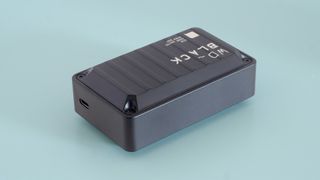
We repeated the test on the SATA-based SureFire GX3, which is much slower on paper. It look just five minutes 49 seconds. We saw even better results from the Crucial MX500 in an external housing, of two minutes 54 seconds.
The smaller Resident Evil 7 saw a similar effect. It look the WD Black D30 Game Drive three minutes 18 seconds, the SureFire one minute 59 seconds. We ran these tests multiple times, using different USB ports on the console to make sure it wasn’t a fluke.
This drive has around 10-12GB of fast storage cache, and the rest is disappointingly slow. You should not buy the WD Black D30 for regular game archiving, because it takes too long. Interestingly, we didn't see the same issue on PS4, where it outperformed the rival SATA drive. This is because the PS4's hard disk read speeds become the bottleneck, and the WD D30 seems to be able to match its performance for as long as you like.
It's also worth bearing in mind the Xbox Series X can’t actually make use of this drive's top speeds either. Its USB ports are USB 3.1 Gen 1s, limited to a maximum of 625MB/s — a lot lower than the 900MB/s possible here.
The PlayStation 5 has faster 1250MB/s ports, but that won't stop the cache from running out, leaving the WD Black D30 feeling more like an old mechanical hard drive, at least when you archive games.
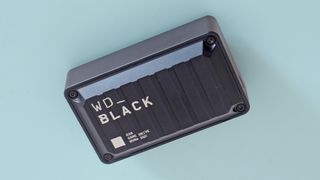
This is only one side of the WD Black D30’s performance. The drive is much better at actually running games. While it can’t — like every drive of this type – actually play games made for Xbox Series X/S or PS5, it can run the last-gen stuff.
While this drive is nowhere near as fast as those consoles’ SSDs, which are 2.5-6 times faster, we were hard pressed to notice the difference in load times in most games without using a stopwatch. Resident Evil 7 loads in 11 seconds, almost identical to the internal SSD, and a saved game load is just nine seconds.
Resident Evil 7 isn’t exactly the slowest-to-load game around, but there was a clear difference when we transferred it to an external Western Digital hard drive (a mechanical one, not an SSD). The game took 24 seconds to load, the save game 34 seconds.
We also tried it with a few games on PS4. It shaved three seconds off the initial load in Life is Strange: Before the Storm, versus the internal HDD, but the 'curated' screen-filled start of Horizon: Zero Dawn seemed to lead to similar initial loads whatever you run the game off.
A drive like this is a perfectly good way to run last-gen games on a current console. It's a decent way to add to your PC storage if you don't want to open it up and add another SSD. But drives that look slower on paper are actually much faster for some jobs, and the Xbox owners don’t get to benefit from its peak speeds anyway.
Buy the WD Black D30 if...
You're after a design made for gaming's thermal loads
The WD Black D30’s larger-than average shell is likely good news for sustained use, as the SSD inside is not crammed into a tight space. And the warmth that radiates out to the exterior suggests the design is actually pretty effective at dispersing the heat generated.
You want a "gamer" look, sans RGB lighting
While it won’t suit all tastes, Western Digital’s Black-series design offers a relatively fresh take on how to make tech look “gamer” like. There’s no over-reliance on distracting RGB lighting, or garish finishes. The contoured plastic casing has a tough appearance that looks great next to an Xbox.
You want to play last-gen games on a new or old console
According to our testing the WD Black D30’s game load speeds are pretty similar to those of an Xbox Series X when running last-gen games (though it can’t run newer ones at all). It is far faster than an external HDD, which is the main goal when buying one of these drives.
Don't buy the WD Black D30 if...
You plan on ferrying about large games installs on the reg
This drive is not great for transferring large game installs. Its speeds tear by until you hit the 12GB mark, then slow down dramatically. We saw much better results from SATA SSDs that look much slower on paper, but can take on data at a more consistent rate.
You're an Xbox gaming performance hound
Don’t take too much notice of the WD Black D30’s 900MB/s max speeds if you plan on using it with an Xbox series X/S. The console’s USB ports are too slow to reach those heights. A PlayStation 5’s rear USBs are not, however, and neither are those of lots of gaming laptops/PCs.
You want a truly ultra-portable SSD
The WD Black D30 is a bit large if you want a pocketable way to carry around a gaming collection. Samsung’s T7 and the SanDisk Extreme Portable SSD are much smaller and lighter, and run at similar maximum speeds.
- Best SSDs: more storage for your gaming needs
Andrew is a freelance journalist and has been writing and editing for some of the UK's top tech and lifestyle publications including TrustedReviews, Stuff, T3, TechRadar, Lifehacker and others.
